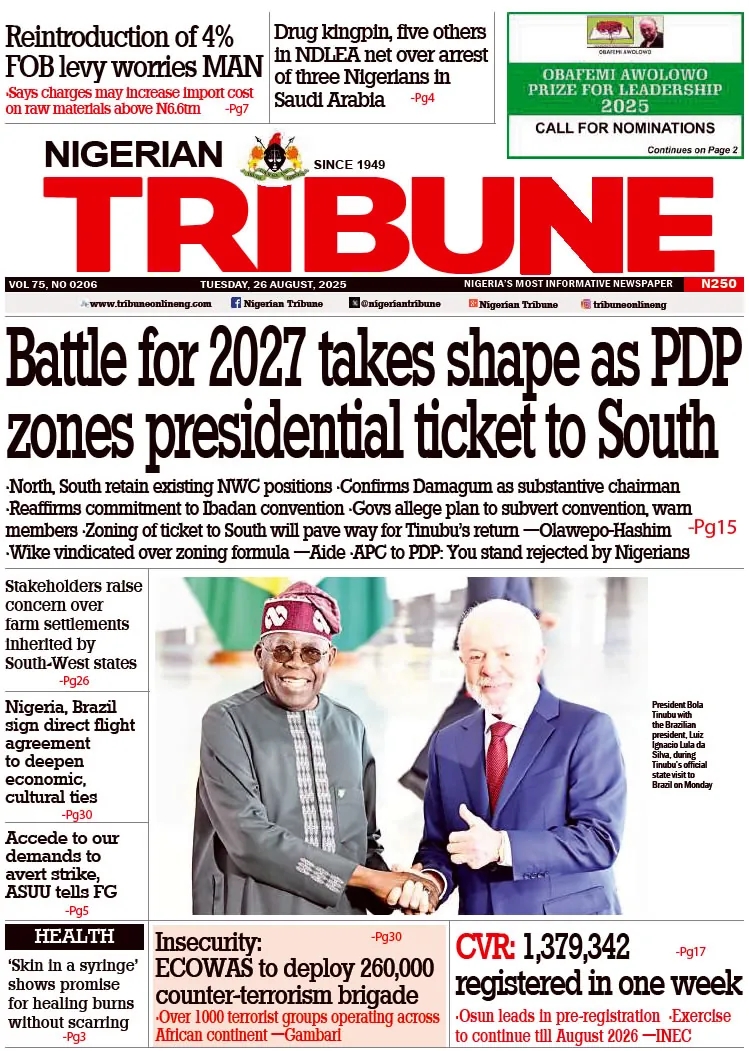ON Tuesday, June 3, the Chief of Defence Staff (CDS), General Christopher Musa, delivered a keynote address at the inaugural Voice of Nigeria (VON) forum themed “Renewed Hope Agenda: Citizens’ Engagement and National Security” held in Abuja. In his address, General Musa advocated the fencing of Nigeria’s borders as a strategic measure to combat the country’s escalating insecurity. He emphasised that Nigeria’s deepening security crisis demands more than conventional military deployments and reactive tactics. “What we face today is not merely a threat to our territorial integrity or to law and order—it is a bold challenge to the very architecture of how Nigeria is governed and protected,” he stated.
At the core of his address were two deceptively simple propositions: empower local governments with real autonomy, and build secure physical barriers along Nigeria’s porous borders. On the surface, these may seem like administrative reforms and infrastructure projects. But on closer examination, they represent seismic shifts both in Nigeria’s political culture and its conception of sovereignty. Imagine a Nigeria where local government councils are not rubber-stamps or cash conduits for state governors, but dynamic, responsive institutions with the authority and resources to protect their communities. This is the future General Musa envisioned when he called for “good governance at the local level.” It’s a future where village heads, council chairmen and ward leaders are not sidelined but are central to Nigeria’s security framework.
The logic is undeniable: who better to understand the intricacies of a community’s security threats than those who live within its boundaries? Yet today, Nigeria’s local governments are often among the most disempowered and dysfunctional arms of governance. Stripped of financial independence and neutered by political interference, they are a little more than administrative shells. General Musa’s call to action here is not merely aspirational. It is a warning. Without functional local governance, all national security efforts are doomed to operate at a dangerous remove—out of touch with the communities they are meant to protect. The General’s second proposition—fencing Nigeria’s extensive borders with countries like Niger, Chad, and Cameroon—may initially strike some as impractical or even extreme. But in an era where non-state actors move more freely than citizens, where cross-border banditry and arms trafficking undermine national security, the need for physical deterrents becomes increasingly difficult to dismiss. Having for long advocated the building of border walls, we endorse the call.
General Musa pointed to real-world precedents—Pakistan’s fencing of its Afghan frontier, Saudi Arabia’s fortified borders with Iraq—as examples where once chaotic boundary zones were brought under control through assertive infrastructure and sustained political will. These are not speculative models; they are case studies in national survival. Still, fences alone cannot keep danger at bay. Without institutional integrity behind them, they become expensive illusions. For instance, Nigeria’s history of corruption at border posts is no secret. From bribed security agents to complicit local elites, the physical barriers it might build are constantly undercut by the moral ones it fails to erect. No amount of concrete or razor wire can compensate for a system that enables and, at times, rewards betrayal from within.
Perhaps the most profound component of General Musa’s analysis is his emphasis on a comprehensive national database. In an age where facial recognition can unlock devices and artificial intelligence can scan cities in real time, Nigeria still stumbles over the most basic questions: Who resides within Nigeria’s borders? What are their origins, affiliations, and intentions? This data vacuum does not just complicate law enforcement, it cripples national planning, weakens border management, and leaves security operations flailing in the dark. Without a functional national identity system, every strategy becomes guesswork and every citizen a potential unknown. What emerges from General Musa’s address, then, is not just a critique of Nigeria’s security shortcomings; it is a mirror held up to a broader failure of governance. Yes, the military can clear terrorist camps in the forests. But who follows the troops to build roads, schools, and clinics? Yes, soldiers can man the borders. But who ensures that the hands collecting bribes at checkpoints are not wearing the same uniform?
This is where the theme of “Renewed Hope,” under which the forum was held, meets its greatest challenge. Hope is not a strategy. Nor is it an excuse to defer responsibility. Nigeria has examples to draw from, technologies to deploy, and frameworks to adopt. What it lacks, still, is the political will to implement them with consistency and without compromise. As Nigeria stands at a perilous crossroads, the stakes are clear. The government must move beyond symbolic reforms and begin dismantling the structures of dysfunction that have kept the world’s most populous Black nation in a state of insecurity and underdevelopment. General Musa did not offer easy answers. What he offered was clarity. And perhaps, most importantly, urgency.
In the end, the durability of Nigeria’s national security will not be measured by the height of its walls or the firepower of its troops. It will be determined by the strength of the institutions beneath them, and the courage of the leaders who choose to defend the rule of law as fiercely as they defend territory. This is the crux of the General’s message. It is not just a military doctrine; it is a national imperative. The country can only ignore it at its own peril.
READ ALSO: How investment in surveillance, intelligence equipment secures Nigerian borders — FG
WATCH TOP VIDEOS FROM NIGERIAN TRIBUNE TV
- Let’s Talk About SELF-AWARENESS
- Is Your Confidence Mistaken for Pride? Let’s talk about it
- Is Etiquette About Perfection…Or Just Not Being Rude?
- Top Psychologist Reveal 3 Signs You’re Struggling With Imposter Syndrome
- Do You Pick Up Work-Related Calls at Midnight or Never? Let’s Talk About Boundaries







